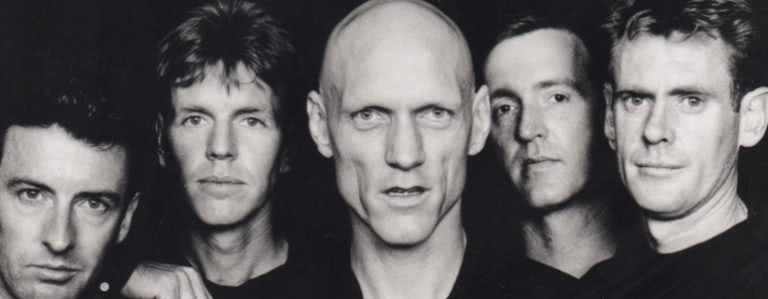Every band that’s ever attained success – big or small – started out as a local unknown fighting for recognition. It’s hard to imagine now, but legendary Australian rockers and political heralds Midnight Oil didn’t always have their sights set on such bold accomplishment.
“At the time it was about getting from gig to gig and song to song and album to album,” says drummer Rob Hirst. “We were just head down, trying to make the whole thing pay and get enough food and sleep every day to do this massive schedule.”
This weekend, The Making Of Midnight Oil exhibition officially launches at the Manly Art Gallery and Museum. Dating all the way back to the band’s early gigs playing under the name Farm, the interactive exhibit charts Midnight Oil’s entire career and features original posters, stage outfits, instruments and handwritten lyrics. Sydney’s Northern Beaches aren’t exactly rock’n’roll territory these days, but it was a different scenario in the mid-’70s.
“The first place the Oils pulled a crowd was the Royal Antler Hotel in Narrabeen,” Hirst says. “When we started, there were bands all up there. The Celibate Rifles used to play there, The Atlantics – all these bands. It was a really great place to play.”
Coinciding with the exhibition launch is the release of seven remastered Oils albums and a new DVD, Black Rain Falls.The DVD contains complete footage of the band’s six-song performance in front of the Exxon Oil building in New York City, 1990. Staging a protest gig in the middle of the world’s busiest city was certainly a gutsy move, but Hirst says it was just a regular day’s work for Midnight Oil.
“We stumbled out of bed after playing Radio City Music Hall onto that stage thinking, ‘Oh, this is fine,’ still rubbing sleep out of our eyes. It’s one of those things you think in retrospect that [it] almost didn’t happen, but at the time it was another gig on a long American/Canadian tour.”
To say it “almost didn’t happen”, Hirst literally means the gig nearly didn’t go ahead. “As we jumped onstage one of the cops said to Gary [Morris], our manager, ‘OK, these guys have got one song, then we’re shutting the whole thing down.’ But then the cops started to slightly move and groove to the music and Gary signalled to play another song. So it was song to song, which was good because halfway through playing it was midday and thousands more people poured out of Rockefeller Center and the Exxon building.”
The guerilla gig – a response to the environmental devastation caused by the Exxon Valdez oil spill off the coast of Alaska in 1989 – was a prime example of Midnight Oil’s concrete commitment to the political ethos emphasised in their songs. Considering the group’s specific address of political matters, such as Aboriginal reconciliation and nuclear disarmament, it’s no mean feat that the band maintains a mass listenership.
“I always said the music has to come first,” Hirst says, “otherwise no-one’s going to take the message of the lyrics seriously. You’ve still got to have a great melody and a great beat otherwise you’re not going to sell the song or the band.
“There’s a lot of power of suggestion in a lot of the lyrics – persuading people to think in another direction, but not demanding it. I don’t think we were actually all that dogmatic – Pete [Garrett] was, with his messages from stage and in some of the interviews, but if you actually listen to the music it was supposed to be more rousing and anthemic. A lot of people just used to come see Oils shows because the men could take their shirts off and drink and throw up on the carpet and have this amazing night out with friends.”
Nonetheless, the band members have never kept their firm opinions to themselves. Interview footage captured in 1990 with Hirst and frontman Garrett slots in between the live performances on Black Rain Falls. At one point Hirst confidently speculates about a positive shift in the world’s attention to environmental perils. It’s now 2014 and the planet certainly isn’t in top shape, but in some respects there has been substantial progress in the last couple of decades.
“I live down in the Manly area, and when we first moved here there was a high temperature incinerator blasting toxins into the air around Manly, and most of Sydney’s shit was untreated and pumped off the coast, and that doesn’t happen anymore. We swim in much cleaner water and people clean up once a year and people don’t throw their cigarette butts on the beach or smoke inside.
“I think every Australian’s job now is to make sure that the current Federal Government is a one-term [government]. My favourite sign from the March In May just read simply, ‘Resign, dickhead.’
“I think there’s been a real turnaround in the last couple of months,” Hirst adds. “It’s interesting that an uncaring, born-to-rule kind of party can wake people up and go, ‘Hang on, we thought this was always a given.’ Kids that are voting for the first or second time, they don’t have the history to think, ‘No, this was hard won by people before.’”
SeeThe Making Of Midnight Oil at Manly Art Gallery and Museum from Friday June 20 to Sunday September 7.Black Rain Falls will be out Friday June 20 through Sony.


































